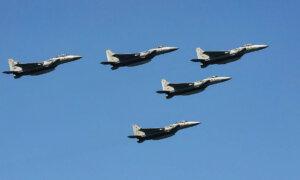WASHINGTON—The White House on April 15 sought to correct reports released about Iran’s recent attack on Israel, specifically calling out the “narrative” that Tehran had informed Washington that the attack was about to happen.
“I’ve seen reporting that the Iranians were meant to fail, and this spectacular and embarrassing failure was all by design,” White House national security spokesman John Kirby said during a press briefing.
“I’ve also seen Iran say they provided early warning to help Israel prepare its defenses and limit any potential damage.
“All of this is categorically false. To steal a phrase from the president, it’s malarkey.”
Iran’s intent to cause significant destruction and casualties was clear by the scale of its attack, he said.
By launching so many missiles and munitions, the aim was to get as many missiles through Israel’s defenses as possible and overwhelm the systems.
Mr. Kirby also highlighted then struck down speculation about messages passed between the United States and Iran concerning the attack.
While he confirmed that Iran and the United States do send messages back and forth, there was no message to anyone on the time frame of the attack, the targets chosen, or the munition used.
The reports were said to be coming out of Turkey and Iraq, and when Mr. Kirby was asked about a discrepancy in the coverage, he dismissed the story as “nonsense.”
“All I’m telling you is it’s nonsense,” he said. “Think about this for a minute. Can you imagine a world in which Iran would pick up the phone and say, ‘Hey, we’re about to try to schwack Israel with 300 cruise missiles and drones, we just wanted to let you know it’s coming, and oh, by the way, here’s what we’re going to hit’? I’m sorry. It just didn’t happen.”
The coordinated attack on April 13 came from the Islamic regime in Tehran and its proxies in Iraq, Syria, and Yemen, according to a senior U.S. defense official.
The Pentagon stated that more than 300 munitions were released toward Israel, including more than 150 one-way attack drones, more than 100 medium-range ballistic missiles, and about 30 land attack cruise missiles.
That attack was an act of revenge for what Iran claims was an Israeli strike on the building next door to its embassy and the Canadian embassy in Syria on April 1.
Of the total munitions, 99 percent of them were intercepted by Israel with the support of the United States, the UK, France, Saudi Arabia, and Jordan.
The interceptions came from scrambling fighter jets, U.S. Navy destroyers in the area, and Israel’s Iron Dome.
“This attack was defeated thanks to our preparations, to a coalition of committed partners, and to Israel’s remarkable defensive systems,” Mr. Kirby said.
His message to Iran that day was simply, “Don’t.”
The United States and G7 nations have also released statements condemning Iran’s attack.
When asked if that refusal to join Israel was a signal to Iran that it could attack without consequences, Mr. Kirby affirmed the U.S. commitment to Israel and said this weekend’s actions should prove its willingness to get involved.
“If I’m sitting in Tehran, and I’m taking a look at what just happened on Saturday night, I don’t think I'd be betting that the United States is not willing to get engaged here and help defend Israel,” he told reporters on April 15.
“I mean, you had American fighter pilots in the air in combat operation shooting down drones and missiles that were heading toward ... Israel, as well as U.S. Navy destroyers at sea, knocking them down from there.
“So the message should be very clear to anybody. When the president says we’re going to take our commitments to the region seriously, when we’re going to help Israel defend itself, we got skin in the game, and we prove that.”
He also said that the White House is going to work with international partners “to work up options” to hold Iran “appropriately accountable.”







